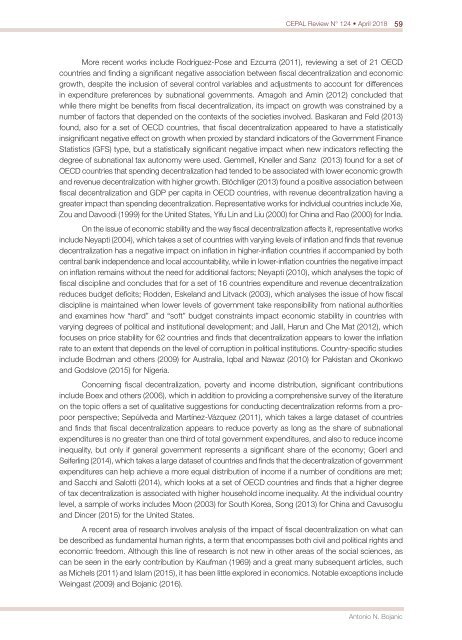CEPAL Review no. 124
April 2018
April 2018
You also want an ePaper? Increase the reach of your titles
YUMPU automatically turns print PDFs into web optimized ePapers that Google loves.
<strong>CEPAL</strong> <strong>Review</strong> N° <strong>124</strong> • April 2018<br />
59<br />
More recent works include Rodríguez-Pose and Ezcurra (2011), reviewing a set of 21 OECD<br />
countries and finding a significant negative association between fiscal decentralization and eco<strong>no</strong>mic<br />
growth, despite the inclusion of several control variables and adjustments to account for differences<br />
in expenditure preferences by subnational governments. Amagoh and Amin (2012) concluded that<br />
while there might be benefits from fiscal decentralization, its impact on growth was constrained by a<br />
number of factors that depended on the contexts of the societies involved. Baskaran and Feld (2013)<br />
found, also for a set of OECD countries, that fiscal decentralization appeared to have a statistically<br />
insignificant negative effect on growth when proxied by standard indicators of the Government Finance<br />
Statistics (GFS) type, but a statistically significant negative impact when new indicators reflecting the<br />
degree of subnational tax auto<strong>no</strong>my were used. Gemmell, Kneller and Sanz (2013) found for a set of<br />
OECD countries that spending decentralization had tended to be associated with lower eco<strong>no</strong>mic growth<br />
and revenue decentralization with higher growth. Blöchliger (2013) found a positive association between<br />
fiscal decentralization and GDP per capita in OECD countries, with revenue decentralization having a<br />
greater impact than spending decentralization. Representative works for individual countries include Xie,<br />
Zou and Davoodi (1999) for the United States, Yifu Lin and Liu (2000) for China and Rao (2000) for India.<br />
On the issue of eco<strong>no</strong>mic stability and the way fiscal decentralization affects it, representative works<br />
include Neyapti (2004), which takes a set of countries with varying levels of inflation and finds that revenue<br />
decentralization has a negative impact on inflation in higher-inflation countries if accompanied by both<br />
central bank independence and local accountability, while in lower-inflation countries the negative impact<br />
on inflation remains without the need for additional factors; Neyapti (2010), which analyses the topic of<br />
fiscal discipline and concludes that for a set of 16 countries expenditure and revenue decentralization<br />
reduces budget deficits; Rodden, Eskeland and Litvack (2003), which analyses the issue of how fiscal<br />
discipline is maintained when lower levels of government take responsibility from national authorities<br />
and examines how “hard” and “soft” budget constraints impact eco<strong>no</strong>mic stability in countries with<br />
varying degrees of political and institutional development; and Jalil, Harun and Che Mat (2012), which<br />
focuses on price stability for 62 countries and finds that decentralization appears to lower the inflation<br />
rate to an extent that depends on the level of corruption in political institutions. Country-specific studies<br />
include Bodman and others (2009) for Australia, Iqbal and Nawaz (2010) for Pakistan and Okonkwo<br />
and Godslove (2015) for Nigeria.<br />
Concerning fiscal decentralization, poverty and income distribution, significant contributions<br />
include Boex and others (2006), which in addition to providing a comprehensive survey of the literature<br />
on the topic offers a set of qualitative suggestions for conducting decentralization reforms from a propoor<br />
perspective; Sepúlveda and Martínez-Vázquez (2011), which takes a large dataset of countries<br />
and finds that fiscal decentralization appears to reduce poverty as long as the share of subnational<br />
expenditures is <strong>no</strong> greater than one third of total government expenditures, and also to reduce income<br />
inequality, but only if general government represents a significant share of the eco<strong>no</strong>my; Goerl and<br />
Seiferling (2014), which takes a large dataset of countries and finds that the decentralization of government<br />
expenditures can help achieve a more equal distribution of income if a number of conditions are met;<br />
and Sacchi and Salotti (2014), which looks at a set of OECD countries and finds that a higher degree<br />
of tax decentralization is associated with higher household income inequality. At the individual country<br />
level, a sample of works includes Moon (2003) for South Korea, Song (2013) for China and Cavusoglu<br />
and Dincer (2015) for the United States.<br />
A recent area of research involves analysis of the impact of fiscal decentralization on what can<br />
be described as fundamental human rights, a term that encompasses both civil and political rights and<br />
eco<strong>no</strong>mic freedom. Although this line of research is <strong>no</strong>t new in other areas of the social sciences, as<br />
can be seen in the early contribution by Kaufman (1969) and a great many subsequent articles, such<br />
as Michels (2011) and Islam (2015), it has been little explored in eco<strong>no</strong>mics. Notable exceptions include<br />
Weingast (2009) and Bojanic (2016).<br />
Antonio N. Bojanic


















